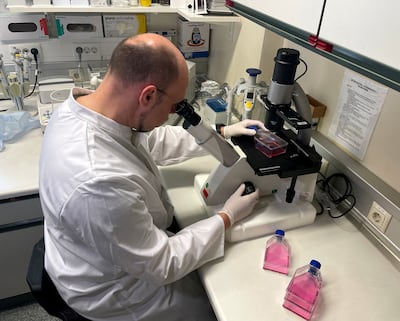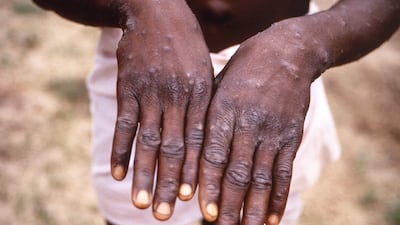The World Health Organisation has described the monkeypox outbreak as “atypical”, but two scientists say it is not the next pandemic.
Professor David Heymann, an expert on infectious disease epidemiology at The London School of Hygiene & Tropical Medicine and fellow at the Chatham House international affairs think tank, said it will not spread the same way as coronavirus.
“This will not be a pandemic as we know pandemics, but it certainly is possible that this disease has spread in many different parts of the world already and we are just beginning to identify it,” he told PA news agency.
“It is not transmitted by air, we don't believe, so it's not a respiratory infection like Sars-Coronavirus-2 [which leads to Covid-19], so it will not spread in the same manner.”

Prof Heymann, the WHO's former assistant director-general for health security and environment, said it is transmitted from people who have monkeypox to people who do not by close contact with a sore.
“If there is close contact, physical contact, there is a chance the virus could spread from the lesion on one person to another person and could enter through a break in the skin or through a mucous membrane,” he said.
“This virus doesn't transmit easily. It is a quite rare disease which has now become more common.”
There are two types of the virus, Prof Heymann said. There is a virus in Central Africa which is very lethal, it has 10 per cent fatality and it causes a disease that looks like smallpox.
“Fortunately, that disease has not spread outside of Africa yet, and hopefully it won't, because people are very sick and they don't travel,” he said.
“The disease that is occurring in Europe and North America is a West African virus-type-strain which is very moderate, it causes skin rash, maybe one or two lesions on the skin, and it can cause a fever and swollen lymph nodes, swollen glands and muscle aches, but it is not fatal in most cases.
“It can be fatal in very less than one per cent of people.”
People can minimise their chances of catching it by protecting themselves from close physical contact and whatever they perceive as physical contact they should modify.
“They should beware that this is spreading and they should be very careful when they have physical contact of any type.
“A handshake would only be dangerous if there is a pox virus lesion on the hand of one of the people who shakes, so they have to do their own risk assessment,” Prof Heymann said.
He said it is “not known” whether there are asymptomatic infections or if every infection causes skin lesions.
Multiple cases in Europe
Dr Hans Kluge, WHO regional director for Europe, said monkeypox cases in several European countries, the US, Canada and Australia are “atypical” for “several reasons”.
Firstly, the rare viral disease is spreading among people with no relevant travel history to areas where monkeypox is endemic, such as in West or Central Africa, he said on Friday.
He said that most initial cases are being detected through sexual health services, adding that “geographically dispersed” outbreaks suggest “transmission may have been continuing for some time”.
Professor Paul Hunter, of the University of East Anglia, an expert in epidemiology of emerging infectious diseases, told PA it is “extremely unlikely” monkeypox will become a pandemic.
“The important thing is there is a vaccine that works and it is the same vaccine that we used for smallpox, but these days, I believe, the best guess I have heard is that it is 85 per cent effective against monkeypox, even if you give it two or three days after somebody has been exposed.
“Ultimately, this is not particularly infectious unless you have close contact with somebody,” he said.
“This isn't a Covid situation at all and if we get the vaccination right, we should be able to bring it under control fairly quickly.
“But this issue is always, is it going to be reintroduced?

